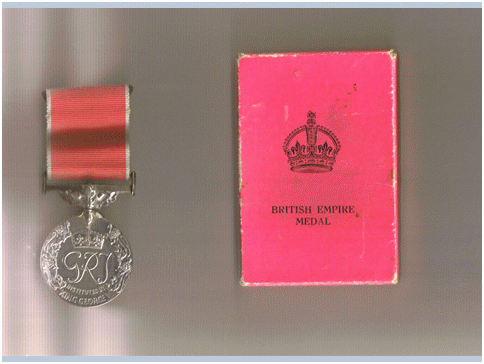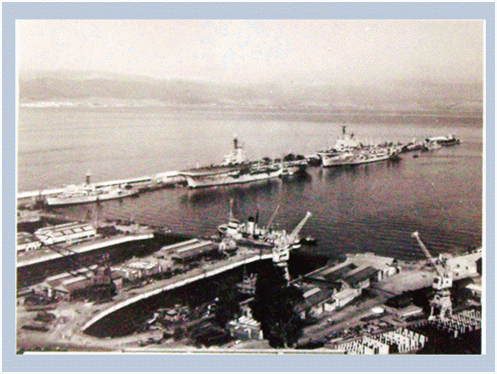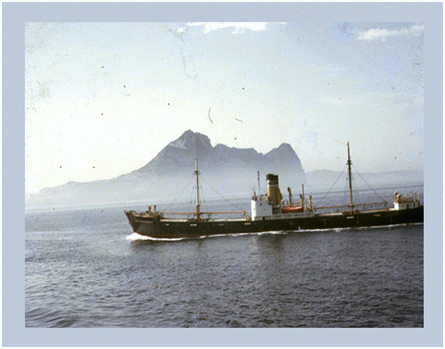

 The South African
The South African
According to Napoleon, the army marched on its stomach, so I suppose the Navy sails on its stomach also. Until recent times food could only be preserved by measures such as drying and pickling. Tinning, refrigeration and plastic wrapping are the chief preservative methods used since then and may not require fuel to cook before hand.
Uncle Norman was born in 1907 in Mirfield in West Yorkshire where he went to school at the Hopton Council School. Like my father, who went to work in an office at 13, he was employed at an early age by the Lower Hopton Co-operative Society in the butchery department. He had a dog called Scott that he left with us when he went abroad. Scott used to guard my pram. Eventually uncle Norman went to Montreal in 1930 to get his meat inspector's 'ticket' and was then accepted by the Admiralty Victualling Department and was posted to Bermuda in the mid-nineteen thirties. He told me that when German ships called, British personnel were placed in dockside crates to photograph as much detail as possible relating to any armament. Before the outbreak of WWII he was back in Britain at the Plymouth dockyard. I remember a visit with him to the dockside and he pointed to the battleship Rodney and a submarine in the distance; at the age of 6, I was not sure I could see either of them.
Early wartime service
Shortly thereafter he was posted to the island of Malta and was present during the siege [1940 - 1942] when King George awarded the George Cross to the island that survived incessant Italian and later German bombing until the eventual deployment of Spitfires. The island became pivotal in the North African campaign. He was fortunate to come home on leave soon after the siege ended.
My father had a reserved occupation in the steel industry and would have been called up had the war not ended. Instead he joined the police as a special constable and attended 22 rifle practice.
One day I was alone at home when the telephone rang [the only one in that residential area]. A posh-sounding young lady asked to speak to Norman Copley. As I had said he wasn't around, she asked me to take a message and gave a number to phone back. I wasn't quite sure what she was talking about, but I mentioned it to uncle when he came in later that day and he knew the number to phone back immediately. At about 8 years of age this was my only contribution to the war effort.
The telephone call concerned his next posting which was to Colombo in Ceylon [Sri Lanka] where the naval dockyard was at Trincomalee on the eastern side of the island. He must have made a good impression there according to the following testimonial:
To: The Director of Victualing,
Admiralty, London
It is desired to bring to the notice the exceptionally good service rendered at Colombo by Mr Copley, Meat Inspector. His extensive knowledge not only of meats and other fresh foods, but of refrigeration matters and of food packing and preservation generally, has been freely available to me, to officers of H M ships and to the Army Authorities in Ceylon [and] has been of great value. Mr Copley has been solely responsible for the arrangements for landing and inward transportation of large quantities of refrigerated stores and has conducted the business with wharfingers [sic], shipping agents and the Ceylon Cold Stores Ltd, with marked ability and success and to my entire satisfaction. He has been responsible since August 1942 for the supply arrangements for all refrigerated stores and bacon to the Army [whose requirements have averaged over 360 tons per month]. The Deputy Director of Supplies and Transport, Ceylon Army Commandhas expressed his complete satisfactionwith the services rendered. Supplies to the Fleet have entailed long hours and detailed arrangements which, of course, have been subject to continual variation due to war conditions. Throughout, Mr Copley has spared no pains to ensure supplies in the best possible condition and has made the best use of the limited facilities and the untrained labour available. The care and ability which has been seen to the package of fruit and vegetables to HM ships by means of Victualing Store Issuing ships has been markedly successful both [in] ensuring the fresh foods were available to isolated spots and that condemnations were reduced to the minimum.
Submitted
Superintendent & V. S. O. Ceylon 26.3.43

Norman Copley's BEM medal and citation
The BEM Citation of December 1943 reads:
Sir,
I am commanded by the Lords Commissioners of the Admiralty to inform you that they have learned with great pleasure that on the recommendation ofthe First Lord the Prime Minister has obtained his Majesty's approval for the award to you of the of the British Empire Medal [Civil Division]. 2. This award will be published in the New Year's Honours list [second part] on the 4th January 1944. I am to request you to regard the above information as confidential until then.
Your obedient servant
[sd] J. S. Barnes
Norman Copley
H M Victualing Depot,
Ceylon
Post-War Contact
I didn't see my uncle for another 12 years until I had started Medical School at Leeds. His department was then stationed in Bath.
Whilst on the ENT hospital ward round, I realised, and the consultant agreed, that I needed a tonsillectomy. After the operation my mother came with me to take the Bath water, staying at the Royal Crescent from where we were able to visit my uncle. He and his wife, Jenny, took us out to dinner to a Chinese restaurant. There were many interesting choices, but my uncle ordered bacon and eggs. He said he preferred to recognise what he was eating! One day in passing he showed me Enfield House bought by the Ethiopian Emperor, Haile Selassie, where he had stayed for a short while with his family and dependents after fleeing from the Italians invading Ethiopia, who had also declared war on Britain. The Emperor later donated the house to the Bath Municipality as a home for the elderly [and visited it again in 1964].
In the late fifties, my uncle was deployed to the Rock of Gibraltar. Over Easter of 1955 I had three weeks' vacation and decided to visit my uncle there. This meant travelling from Yorkshire to southern Spain.
Spanish Sojourn
For a student, this meant hitch-hiking. After the Dover ferry I turned right on reaching Avignon. Being the Easter weekend the traffic was mostly local, and after being offered a lift by a man who turned out to be the Duc de Maximillian, I was privileged to be invited to stay overnight at his summer residence near the Pont du Gard.
After reaching Barcelona there was little traffic on my intended coastal route compared with the Madrid road. [Until then I had not realised that hitch-hiking was illegal in Spain, so I then simply walked on the right side of the road and did not use my thumb]. Later the traffic became sparse; it was almost dark so I asked a passing man in the village of Esplugas de Lobrega for the nearest posada to spend the night. He laughed and said it was 10 leagues further on. He had a girlfriend, the local Post Mistress, who arranged for me to stay at the Post Office in the company of the resident telegraph ladies.
On reaching the outskirts of Madrid I took a taxi to 'el statione del sud'. Whilst I was gazing at the huge departure board a Spanish gentleman asked if he could be of any help. He not only assisted me in getting a ticket for Algeciras, but accompanied me to my seat and introduced me to my fellow passengers. I remember one lady was a nurse en route for Tangiers. I was also instructed to get off the train at San Roche, the closest station to La Linea, at the Gibraltar border.
Next morning I dismissed the crowd of taxi drivers and started walking towards La Linea until I was overtaken by a car offering a lift at a quarter the price. I had to disembark at the border post and take the bus for the rest of the way, crossing the military airstrip to reach the town. I arrived at the Hotel Havencourt, where my uncle and aunt were staying, just in time for lunch.

Gibraltar dockyard, South Mole.
HMS Charity extreme left.
Photo: Copley
I had a swim in the Atlantic Ocean and was taken to see the famous apes. Water is scarce on the rock, but the heights are criss-crossed with concrete channels that catch the condensation from the semi-permanent cloud overhead. On the Sunday we went to Algeciras to watch my first and last bull fight. I was surprised to see small children there, in their Sunday best. I watched my uncle playing tennis; he was then champion of the Rock [as well as of his previous three islands].
Voyaging home
As my remaining vacation time was too short to allow me to hitch-hike home, I asked my uncle if there were any supply ships returning to 'Blighty'. As there were none, uncle said that he would phone the harbour master who told him that the Mediterranean Fleet would be returning home in two days' time.
My uncle arranged a passage to England for me as his 'son'. At the appointed time I was taken to the South Mole. At the top of the gangway I looked up and saw the name of the ship - HMS Charity, a C class destroyer. I was introduced to the Commander who kindly asked if I wouldn't mind spending 3 days with the fleet in Algiers before heading for home, to which I assented without demur. I and a petty officer were assigned beds in a part of the officers' wardroom that could be curtained off at night.
On the way, the Fleet sailed into the Bay of Arzew, on the coast of Algeria, in line astern with the cruiser Glasgow and the other two destroyers, HMS Chevron and HMS Surprise, to shell the French gunnery range; our ship scored a direct hit on a tank 7 nautical miles away. The crack of shell fire meant that one should not be on deck at the same time; the cotton wool supplied was of little help even below deck.
Approaching Algiers we had a 21 gun International salute and a 19 gun salute for our Admiral, Guy Grantham, C in C Mediterranean Fleet. Fortunately the return bangs were performed by the Glasgow. I was able to go ashore and explore the Casbah, which was denied to our crew members in view of the ongoing revolution. I climbed as far as a palm-lined Moorish palace. A beautiful large house was open to visitors who were later informed that it was 'une maison indécent'. At one of the shops at the entrance to the Casbah a charming assistant wanted to know what a medical student was doing in Algiers. I couldn't afford a nice ivory bracelet for my girl-friend at home and bought one or two small things. Imagine my surprise when I found that the ivory bracelet was included amongst my other purchases with the compliments of Mektoub.
I sent a telegram to the Dean's office at Leeds to say that I should be 2 weeks late in returning for the next term, which caused some surprise.
I took the westward road that runs by the sea in order to have a swim and was fortunately picked up by 2 national service officers from the ship, in a consulate car, with the same intention. We eventually found a sheltered beach near Sidi Farouk [an Allied landing beach]. I was able to return their hospitality when one of them trod on a sea urchin. My French came in useful to ask a matron sitting nearby for the loan of a sewing needle with which to extract the spines. I was given a lift back to the ship.
My only disappointment was that evening in my uncle's borrowed jacket and trousers I was not considered smart enough to be invited to the cocktail party on the Glasgow.

Pillars of Hercules
Photo Copley
On the return journey we sailed without HMS Surprise, as she was taking the Admiral back to Malta, and headed for the Pillars of Hercules, but did not stop there. Mail was collected as we sailed round the Bay of Algeciras. There was a signal for me from my uncle, 'bon voyage'.
The Glasgow left us during the night and the Chevron 'shelled' us from 24nm miles away. Charity then turned North over the site of the battle of Trafalgar to meet the head-on swell of the Bay of Biscay by next morning. It was a little embarrassing to find the storm fences on the table and me the only person well enough to think of breakfast.
We entered the Solent next morning to be greeted by a salute of 19 guns. [I thought perhaps it was for me, but our Captain Downay of the Glasgow had been promoted to admiral.]
It was a nice surprise to have been moored not far from HMS Victory at Portsmouth which we passed on our walk towards the railway station for Leeds. Unfortunately it was not open to visitors so early in the morning.
When my uncle came to the North of England on leave, I was able to take him with me to the High Court [part of my forensic education at Leeds] where we followed the defence lawyer, Rose Heilbronn, ultimately the first woman judge, who was defending a woman accused of her husband's phosphorus poisoning. She challenged the prosecution's reliable source of information, which turned out to be a book from 1936. My uncle was not able to attend the last day when the black cap was used to pronounce the death sentence. She had lied about her age and being now too old for capital execution, the sentence could not be carried out.
In 1960, then just qualified and married, I was called up for National Service and put down the Navy as first choice since my uncle was there. This entailed an interview at Admiralty House in London. The interview went well, but they said that they were not taking married men. Being inside the security area, I decided to give my uncle a surprise in his office. He introduced me to some of his team. By this time he was Admiralty tennis champion and had beaten an opponent half his age. He said that had the same job as Samuel Pepys, but without the perks.
Being in London for some research at the National Records Office in London, I was able to visit my uncle and aunt at their house in Ewell, Surrey. That was the last time I saw Uncle Norman as I was posted with the RAMC to Kenya for the next 4 years. He died suddenly shortly after retirement in 1962.
About the Author
Ian Copley has contributed many articles to the Journal. A former Society Chairman, he has retired as a Neurosurgeon and lives in Port Elizabeth.
Return to Journal Index OR Society's Home page
South African Military History Society / scribe@samilitaryhistory.org